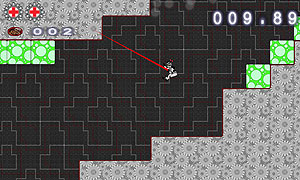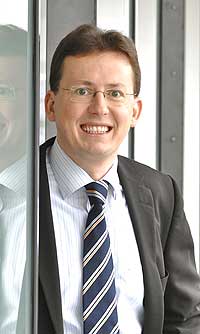Not just the local hero
“It makes no sense to be just the local hero. If we want to develop further, we’ll need to follow international research standards” emphasises Juergen Muench. The German Professor has been leading the Software Systems Engineering research group at Helsinki University’s Department of Computer Science since 2011.
Recruiting visiting researchers is one necessity in the internationalisation process, another one is the use of English in group and research meetings. Muench is impressed that Finnish researchers usually speak fluent English: “This is different from several other countries where you easily encounter language-based problems.”
Language constraints
It helps that English is the global research language in Computer Science communities. However, there are situations that demand more careful articulation, as research organisation leader Professor Petri Myllymäki admits: “Suddenly you feel you had better express this in your mother tongue”.
Muench has been experiencing this also in his unit: “I am aware that some critical administrative or strategic decisions are made by Finnish-only speaking circles, and this is challenging. My strategy is to monitor decision-making processes closely”.
A strategic decision
It was more than ten years ago that English was systematically introduced at the Department of Computer Science. “That was the time when we started to employ more and more international PhD students and postdocs, and the well-being of our international staff became more important”, says Professor of Computer Science Hannu Toivonen, head of the department 2007–2009.
A strategic decision was then made that any Finnish email sent to the staff email list had to contain at least one explanatory English sentence. Also, a professional translator was employed that started transferring all relevant contents to English.
“Among these were many items of Finnish information released by the central administration that had so far remained hidden from non-Finnish speakers”, adds Toivonen.
In order to empower the international staff, an international well-being group was called into being. Soon an international department blog and webpages for newcomers were launched, and English slowly made its way into staff meetings and events.
Challenges beyond language
Whereas the English language has become an absolutely natural and integral part of communication at the Department of Computer Science, the professors point out other soft spots: “Perhaps the challenge is not so much the language, but rather the cultural differences”, ponders Muench. “This concerns, for instance, ways of working, views on quality, levels of loyalty and ways of motivating people”.
For Myllymäki, it is the different understanding of self-regulation and personal engagement that proves challenging: “As a Finn, I expect the researchers to be proactive and develop their own project ideas. However, it often turns out that employees from non-European cultures are waiting for my order. In Asia, for example, it may be undesirable to initiate something unless being ordered to do so”.
In the photo: Juergen Muench
Source: Flamma, the intranet of the University of Helsinki
Text: Claudia Gorr
Photo: Ari Aalto
Original article in Flamma: https://flamma.helsinki.fi/en/HY277798

 Mika Urtela and Hannu Pajula, graduates of the Department of Computer Science, are realising their piña colada-flavoured dreams in their game-producing company, Soul Aim Studios. This is the beginning of their story. The piña colada part of it has not come true yet, but they're working at it.
Mika Urtela and Hannu Pajula, graduates of the Department of Computer Science, are realising their piña colada-flavoured dreams in their game-producing company, Soul Aim Studios. This is the beginning of their story. The piña colada part of it has not come true yet, but they're working at it. FiDiPro - the Finland Distinguished Professor Programme - enables distinguished international researchers to work and team up with the 'best of the best' in Finnish academic research. Financed by the Academy of Finland and Tekes, FiDiPro makes it possible to recruit highly merited scientists who are able to commit to long-term cooperation with a Finnish university or research institute.
FiDiPro - the Finland Distinguished Professor Programme - enables distinguished international researchers to work and team up with the 'best of the best' in Finnish academic research. Financed by the Academy of Finland and Tekes, FiDiPro makes it possible to recruit highly merited scientists who are able to commit to long-term cooperation with a Finnish university or research institute. The Faculty of Science invited Linus Torvalds to be its honorary alumnus in Kumpula. During its alumni event, the faculty also named one of its lecture halls after Linus Torvalds. On the event held on Thursday 17 March, young researchers were the main speakers, and the 350 guests on the science campus gave them their full attention.
The Faculty of Science invited Linus Torvalds to be its honorary alumnus in Kumpula. During its alumni event, the faculty also named one of its lecture halls after Linus Torvalds. On the event held on Thursday 17 March, young researchers were the main speakers, and the 350 guests on the science campus gave them their full attention.